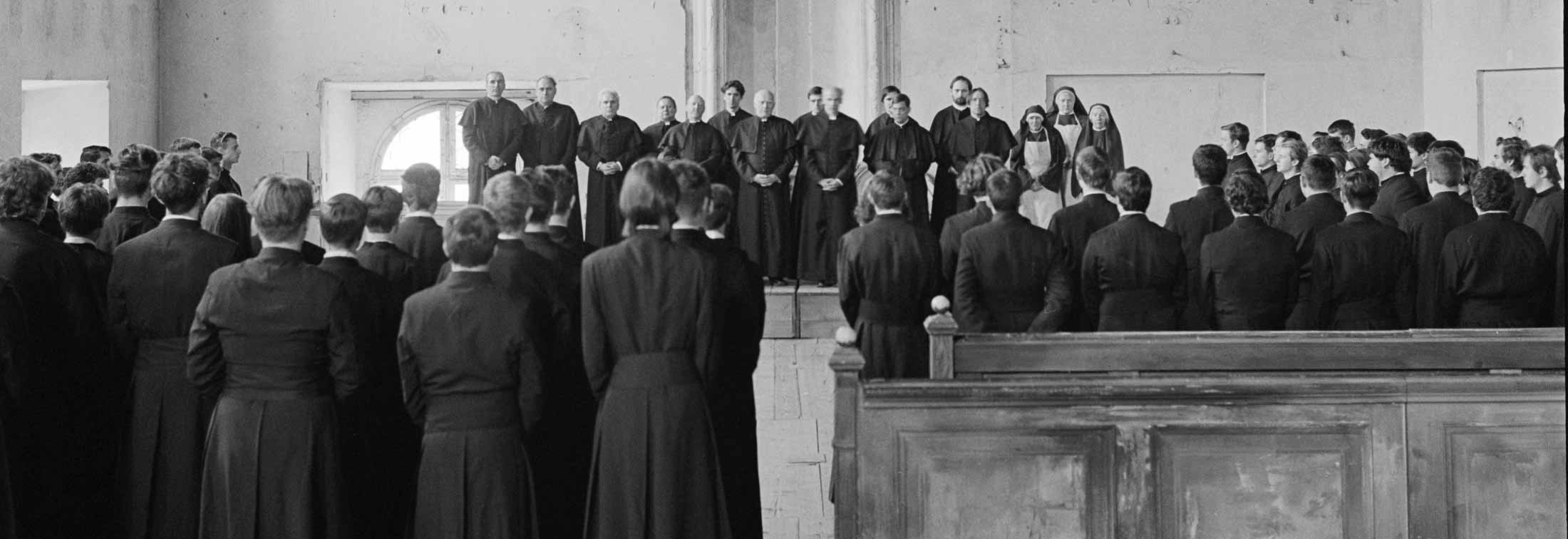
In the decades since the fall of the Soviet Union, many filmmakers who grew up behind the Iron Curtain have used the medium to capture their experience of that surreal moment in history. Each subsequent film adds to the strange puzzle of that period, and allows these artists and their country to grapple with it. In Czech director Ivan Ostrochovský's new film 'Servants', he captures a collision point between religion and communism - one struggling to survive through the stronghold of the other.
Set in a boys theological seminary in 1980, 'Servants' sees these young men, having committed themselves to their Catholicism, reconciling it with the demands of the State, inherently suspicious and antagonistic towards religious beliefs but willing to allow them under strict guidelines. Within the seminary, the boys have begun committing quiet acts of revolution, calling out the actions of the State and transmitting them out into the world through illegal radio channels. An investigation is launched, led by the quiet yet menacing Dr Ivan (Vlad Ivanov, 'Snowpiercer', 'Graduation'), one that puts the safety of the seminary and those protected by it at serious risk.
Deprecated: strpos(): Passing null to parameter #1 ($haystack) of type string is deprecated in /home3/makethes/domains/maketheswitch.com.au/public_html/articleamp.php on line 1176
Deprecated: strpos(): Passing null to parameter #1 ($haystack) of type string is deprecated in /home3/makethes/domains/maketheswitch.com.au/public_html/articleamp.php on line 1176
Deprecated: strpos(): Passing null to parameter #1 ($haystack) of type string is deprecated in /home3/makethes/domains/maketheswitch.com.au/public_html/articleamp.php on line 1176
There's a strong kernel at the heart of 'Servants', particularly that conflict between religion and politics in the Soviet Union, but while it form a good foundation, the film itself never makes much of it. Even at an hour and a half the material feels stretched, and the narrative and character development are missing the necessary steps to really make us care for these characters and feel the tension inherent in their situation. There's a lot of space in this film, moments of stillness and silence, but rather than those moments feeling vital and alive, shimmering with the threat of potential, they mostly feel empty. This isn't the kind of film to offer you historical facts and tidbits as context, and thank goodness, as it would be a lesser film if it were to do so. What these kinds of films offer is a portrait of experience, to glimpse back in time and see how one lived and survived in such a world, but Ostrochovský doesn't offer enough for us to have a grasp of this.
What we're offered instead - and is both to its advantage and disadvantage - is a film of staggering images. Juraj Chlpik delivers some of the most breathtaking cinematography of the year, this cold world of snow and concrete and monoliths of industry captured with horrifying magic within the black and white 1.33:1 frame. Chlpik's work is the highlight of 'Servants', with not a shot wasted or a moment not composed for maximum effect, but while they offer us a window-view of Czechoslovakia in 1980, Ostrochovský never gives us the opportunity to open that window and enter. For all its aesthetic beauty and its circumstances driven by passion and belief, 'Servants' is a cold and distant film. We never get a true sense of the fire and passion driving these young men, or even a firm grasp on the conflict within those caring for them.
For all its aesthetic beauty and its circumstances driven by passion and belief, 'Servants' is a cold and distant film.
That isn't to say that the fundamentals of these techniques are to blame. This kind of austere, highly composed filmmaking has resulted in some remarkable cinema, but what is missing from 'Servants' is a sturdy foundation or a robust understanding of its intentions. I walked away from the film unsure of what I was supposed to take away from it, and unsure of how to read some of the symbolism in the film, suspecting that it was either too obtuse or too on-the-nose. I certainly enjoyed the film, and found much to admire in it, but that admiration just highlighted its problems. Something was missing from it, but it's not entirely clear what it is.
As a piece of filmmaking, 'Servants' is certainly impressive, filled with striking cinematography and flashes where we glimpse the strange, surreal world behind the Iron Curtain in Czechoslovakia. What is even more beguiling about the film is reminding one's self that this is set in 1980, the very recent past. The world we see feels captured in time, a vision of a post-war world rather than a more contemporary one. Unfortunately, full advantage of these elements is never taken up, and in the end, 'Servants' also feels like an unfinished film, an idea taken to a certain point but never given the opportunity to fully grow. It's a pity, because all the hallmarks are there of an intriguing film and an intriguing filmmaker.